
American Revolutionary War
Women in the Revolutionary War
Coming Soon
Coming Soon
Left mainly to her own resources, it was through bloodshed and devastation and the depths of wretchedness that [South Carolina’s] citizens were to bring her back to her place in the republic by their own heroic courage and self devotion, having suffered more, and dared more, and achieved more than the men of any other state.
George Bancroft, History of the United States (1857)
Heritage Library Celebrates the 250th Anniversary of the American Revolution
Explore Hilton Head’s Unique Roll in America’s Bid for Freedom
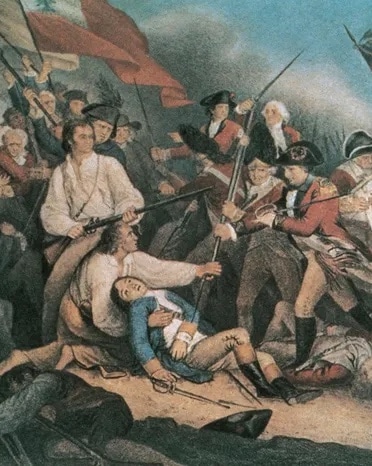
Following the French and Indian War, the revenue-raising acts imposed by Parliament created a growing antagonism among the landowners of South Carolina. Lowcountry elite organized protests and meetings with other colonists around common grievances. Political divisions grew, even building a strong loyalist population that endured through the war.
South Carolina patriots advocated for their right to self-government and established a provincial congress in January 1775. The Provincial congress established a Council of Safety and raised two regiments of foot and one of cavalry, which eventually was placed under the authority of the Continental army.
Hope for reconciliation with Great Britain had its followers but a temporary constitution was adopted and delegates were sent to the Second Continental Congress in Philadelphia. On July 2, 1776, South Carolina joined with the other colonies in a unanimous vote for the independence of the United States.
The Heritage Library Foundation joins the SC 250, SCPRT, America 250, NPS and others across the state and the country as we celebrate the 250th Anniversary of the American Revolution and strive to share educational resources with all who want to learn more about this important time in our nation’s history.
Continue to visit this webpage and the websites of our partners as we add resources throughout the celebration.
The Patriots of Zion Chapel of Ease Cemetery
The Patriots of Zion Cemetery answered the call of freedom during the American Revolution. Hilton Head Island was a Patriot stronghold, while many surrounding areas, including Daufuskie Island were held by the Loyalists. Major battles were not fought on the Island but skirmishes on and around the Island helped local militia earn the title of “Bloody Legion.” The Bloody Legion was a name given to both the Hilton Head militia and a unit of British soldiers led by Banastre Tarleton. The Hilton Head militia fought battles from Savannah to Charleston. They were known for their raids and support of the Continental Army. The Loyalist newspapers in Charleston and Savannah called them the Bloody Legion.
During the American Revolution, the term Tory was used interchangeably with the term “Loyalist” in the Thirteen Colonies to refer to colonists who remained loyal to the British Crown. The term contrasts the colloquial term used to describe describer supporters of the revolution, “Patriots” or “Whigs”.
We know that at least 4 patriots have gravestones and memorials at Zion Chapel of Ease Cemetery. Work done using ground penetrating radar indicates that more than 60 unidentified graves exist at the cemetery and we might never know if any of those sites belong to a patriot.
Jack Stoney
After arriving from Ireland in 1774 aboard his own ship and obtaining his privateer license to plunder Spanish ships, Stoney became a landowner and planter. During the revolution, he resumed his privateering against British ships as part of the island’s Patriot Militia and served as a dragoon when not at sea.
Charles Davant
A resident of the island starting in the 1740s, Charles Davant owned Two Oaks Plantation (near modern Indigo Run Plantation) and served as a platoon leader with the island’s Patriot Militia. After one night’s patrol of the island’s southern beaches, he was ambushed by British and Loyalist raiders from Daufuskie Island and died after riding nearly two miles back home. He remains the only known local death resulting from the war.
James Davant
The brother of Charles Davant, James Davant’s most notable action during the revolution came as an act of revenge for the death of his brother. Two months after Charles was ambushed, James led a raiding party to the Daufuskie Island home of the tory Martinangel brothers who had led the fatal ambush and killed them both.
Isaac Baldwin
An ironworker from New Jersey who came to the island in 1773 to work at Hilton Head’s shipyards, Baldwin found himself unemployed after British warships destroyed the Broad Creek boatyard where he worked. Joining the militia, he would rise from private to lieutenant by the end of the war. He was elected to the state legislature after the war, but resigned after a year to return to Hilton Head Island.
Visit Zion Chapel of Ease Cemetery to learn more.
Additional Information about Hilton Head Island and Beaufort County in the Revolutionary War
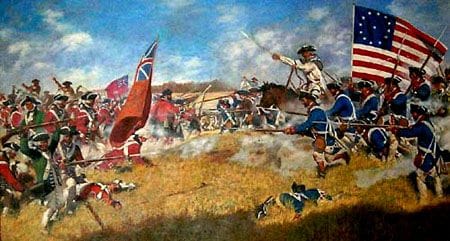
Battle of Port Royal Island
This battle was the major engagement in Beaufort County, where British forces attempted to seize Port Royal Island, but were defeated by American militia under Moultrie.
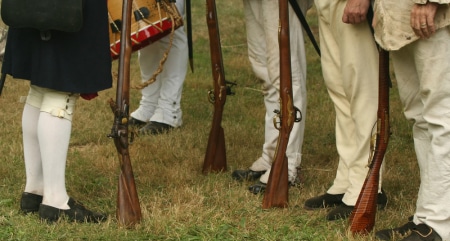
British Occupation
Following the battle, the British occupied Beaufort and Port Royal Island for a significant period, conducting raids on nearby plantations and settlements.
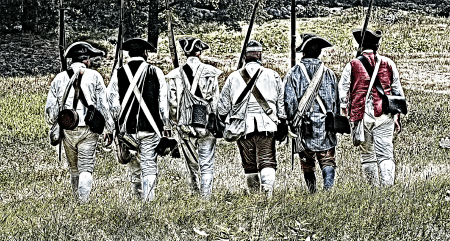
Local Patriots
Notable local figures like Daniel Heyward, Jr., and John Barnwell are recognized as Revolutionary War heroes from Beaufort County.
Impact On The Area
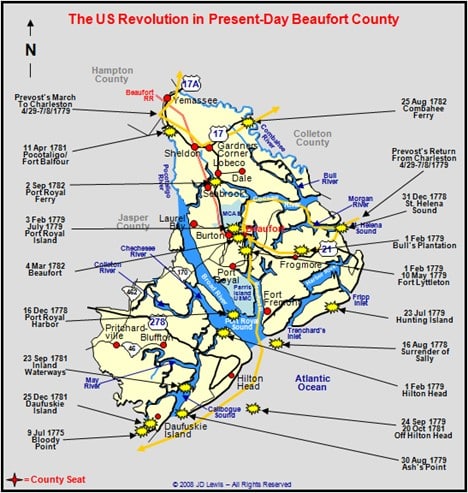
Educational Resources
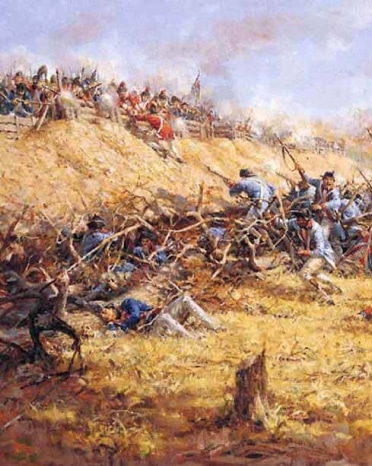
South Carolina was a leader in the American Revolution, with more than 200 battles and skirmishes taking place in the state, more than any other colony. The war in South Carolina was pivotal in the ultimate outcome of the war, and helped transform the King’s colonies into a union of states.
South Carolina had one of the strongest Loyalists factions of any state. About 5000 men took up arms against the Patriot government during the revolution, and thousands more were supporters who avoided taxes, sold supplies to the British, and who had avoided conscription.
There is much to learn about this time and history –
The Library has more than 150 books focused on the American Revolution on our shelves and we welcome you to come in and explore what we have to offer. Search the catalogue to see all that you can find at Heritage Library.
SC250 and SC State Department of Education provide a wealth of educational resources for teachers, students and everyone interested in learning about the pivotal role South Carolina played in the Revolutionary War. Connect with the state’s resources at https://southcarolina250.com/education-resources/
Additional Education Links
- America 250 – https://america250.org/
- National Park Service – https://www.nps.gov/subjects/americanrevolution/index.htm
- SC Department of Archives & History – https://scdah.sc.gov/research-and-genealogy/resources/military-records/resources-american-revolution-south-carolina
- Library of Congress – www.loc.gov
